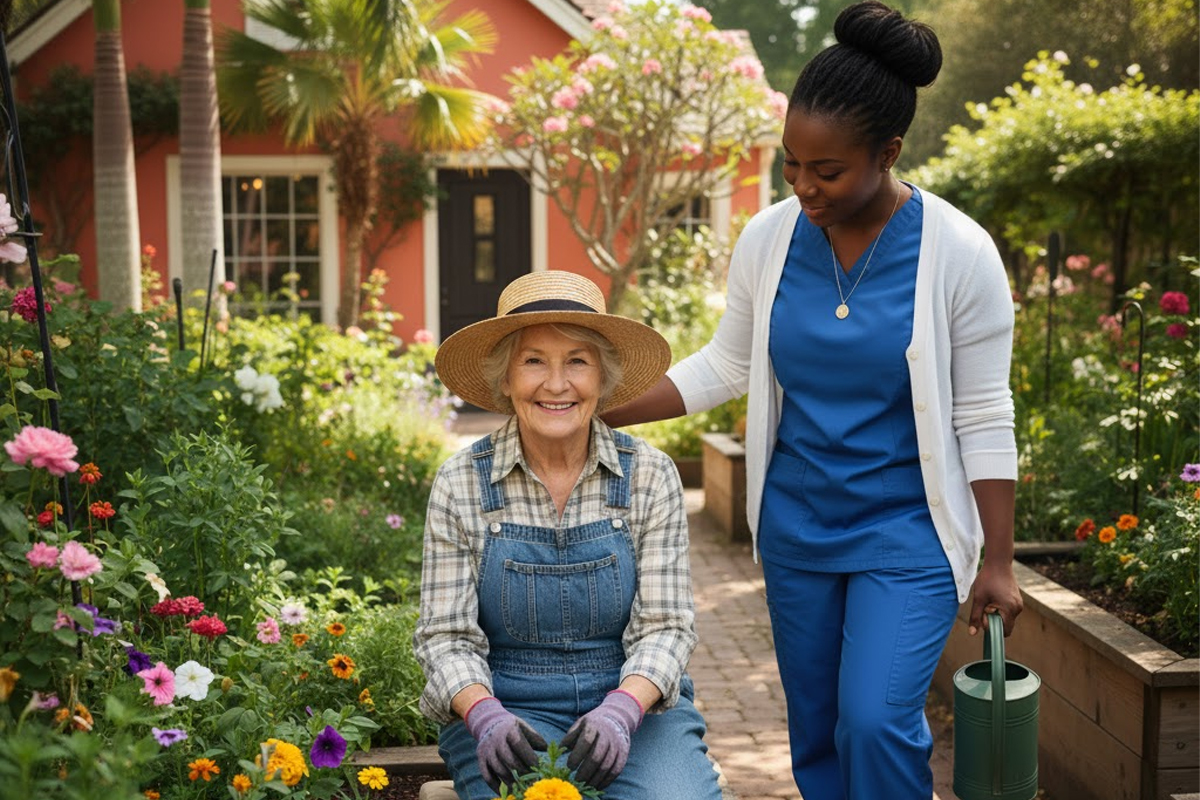Share

Benefits of Gardening for Seniors
Gardening is more than just a hobby — it’s a therapeutic and rewarding activity that promotes physical, emotional, and mental well-being. For older adults, the simple act of planting flowers or tending to vegetables can provide a sense of purpose, connection, and peace. Whether done in a backyard, balcony, or community garden, senior gardening offers countless benefits that enhance overall quality of life.
In this article, we’ll explore the benefits of gardening for seniors, share helpful gardening tips for the elderly, and explain how this gentle yet meaningful activity supports healthy aging.
1. Physical Health Benefits of Gardening for Seniors
Gardening keeps the body moving in a safe, low-impact way. Digging, planting, watering, and weeding may seem simple, but these activities promote flexibility, strength, and coordination. For seniors, these movements help maintain mobility and independence.
Key physical benefits include:
-
Improved strength and balance: Regular gardening helps reduce the risk of falls by enhancing muscle control and coordination.
-
Better heart health: Light aerobic activity like gardening improves circulation and cardiovascular health.
-
Joint flexibility: Gentle stretching while reaching or bending promotes joint mobility without high strain.
-
Sunshine and vitamin D: Spending time outdoors allows the body to absorb vitamin D, which supports bone health and boosts mood.
Tip: Encourage seniors to take breaks, use raised garden beds, and wear supportive footwear to reduce strain while working in the garden.
2. Mental and Emotional Benefits of Gardening for the Elderly
One of the most powerful aspects of therapeutic gardening for seniors is its impact on mental health. Being outdoors, surrounded by nature, reduces stress and provides a sense of calm. The slow, mindful process of caring for plants allows older adults to stay present and engaged.
Emotional and psychological benefits include:
-
Reduced anxiety and depression: Gardening has been linked to lower cortisol levels, the hormone responsible for stress.
-
Enhanced mood: The combination of sunlight, fresh air, and gentle movement helps release endorphins, improving happiness and energy.
-
Sense of accomplishment: Watching plants grow under their care can boost confidence and self-esteem.
-
Mindfulness and relaxation: Focusing on tasks like watering or pruning allows seniors to disconnect from worries and enjoy the moment.
For seniors dealing with memory loss or cognitive decline, gardening can be particularly therapeutic. Repetitive actions, familiar scents, and tactile sensations can help trigger positive memories and stimulate brain activity.
3. Social Benefits: Gardening Builds Connection
Gardening can also be a social activity that fosters companionship and teamwork. Whether joining a community garden or planting alongside family members, seniors can strengthen relationships through shared experiences.
Social advantages include:
-
Opportunities for connection: Group gardening projects encourage conversation and teamwork.
-
Combats loneliness: Regular interaction with others helps reduce feelings of isolation, especially for homebound seniors.
-
Bridges generations: Gardening with grandchildren can be a joyful, educational experience for both young and old.
Tip: Home care agencies like Caring Home Care can help seniors participate safely by arranging companion caregivers who assist with outdoor activities, ensuring seniors enjoy gardening comfortably and confidently.
4. Cognitive and Therapeutic Benefits of Gardening for Seniors
Engaging in therapeutic gardening stimulates the brain while providing emotional healing. Studies have shown that gardening can help improve memory, concentration, and sensory awareness in older adults.
Cognitive benefits include:
-
Boosted brain function: Planning, planting, and problem-solving stimulate cognitive processes.
-
Memory reinforcement: Repetition and familiarity in gardening routines can strengthen short- and long-term memory.
-
Therapeutic effects for dementia: Sensory gardens — filled with fragrant herbs and colorful flowers — can calm agitation and promote emotional well-being for those with Alzheimer’s or dementia.
For many seniors, gardening provides a sense of control and responsibility. Caring for plants allows them to nurture life, fostering a feeling of purpose that is deeply therapeutic.
5. Gardening Safety Tips for Seniors
While gardening is generally safe, seniors should take certain precautions to protect themselves from injury or fatigue. These gardening tips for the elderly can make the experience enjoyable and risk-free:
Practical safety tips:
-
Use adaptive tools: Lightweight tools with ergonomic handles help reduce strain on hands and wrists.
-
Create raised beds: Elevated garden beds minimize bending or kneeling.
-
Stay hydrated: Bring water and take regular breaks, especially in hot weather.
-
Wear protection: Gloves, sunscreen, and hats protect against cuts and sunburn.
-
Plan for accessibility: Keep tools and plants within easy reach to prevent overexertion.
If mobility or balance is a concern, a caregiver can assist with tasks like lifting pots or watering plants. At Caring Home Care, our caregivers help clients enjoy activities like gardening safely, ensuring each experience is relaxing and beneficial.
6. Gardening as Part of a Holistic Home Care Routine
Incorporating gardening into a senior’s daily or weekly routine can enhance their physical and emotional health. It’s a simple way to promote active living, provide structure, and add joy to everyday life.
Home caregivers can play an essential role in supporting seniors with this activity — from preparing soil to organizing small garden projects. Through compassionate assistance, seniors can continue enjoying the therapeutic benefits of gardening without overexertion.
At Caring Home Care, we understand that wellness starts at home. Activities like gardening encourage a sense of independence while fostering joy and relaxation. Our team of qualified caregivers supports seniors in leading fulfilling, active lives in the comfort of their homes.
Conclusion
The benefits of gardening for seniors extend far beyond physical exercise. This therapeutic and enriching activity nurtures the body, mind, and spirit. Whether planting flowers, herbs, or vegetables, gardening empowers seniors to stay active, positive, and connected to nature.
With the right tools, guidance, and a helping hand, every senior can enjoy the satisfaction of watching something they’ve planted grow and flourish — just as they continue to thrive in their golden years.
If you or your loved one could benefit from support at home, Caring Home Care is here to help.
Our caregivers provide compassionate assistance that makes daily life — and hobbies like gardening — safer, easier, and more enjoyable.
Why Professional Home Care Is Safer Than Family Only Care Caring for an aging loved one is deeply personal. Many families step in with the best intentions. However, as care needs increase, family only caregiving can become overwhelming and risky. This is where professional home care plays a critical role. Professional caregivers are trained, experienced,
Connecting During the Thanksgiving Holiday: How to Support Your Elder Relatives The Thanksgiving holiday is a time filled with warmth, gratitude, and meaningful family traditions. However, for many older adults, it can also be a period of loneliness or emotional distance. This is especially true for seniors who live alone, have limited mobility, or are
Transition to In-Home Care: Helping Seniors Adjust Comfortably to Elderly Care Services Understanding the In-Home Care Transition The decision to begin in-home care is a big step for both seniors and their families. It often marks the start of a new chapter—one focused on safety, comfort, and support. However, the in-home care transition can bring
Celebrate Holidays with Seniors: Creating Joyful and Meaningful Moment The holiday season is a time of warmth, joy, and connection. For seniors, it’s an opportunity to celebrate cherished traditions and create new memories with loved ones. However, the holidays can also bring challenges — from health concerns and limited mobility to feelings of loneliness. With
Need A Caregiver? Fill Out Form Below
With our competitive rates, we make receiving in-home care affordable regardless of whether you’re using your insurance or paying out of pocket.






